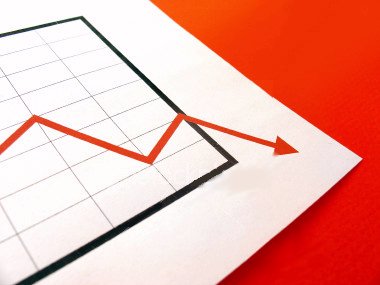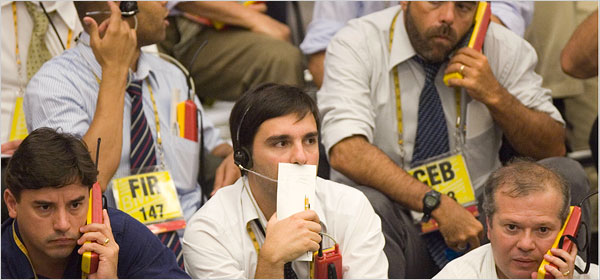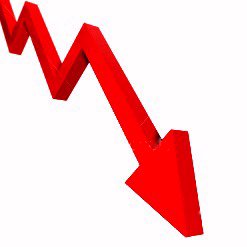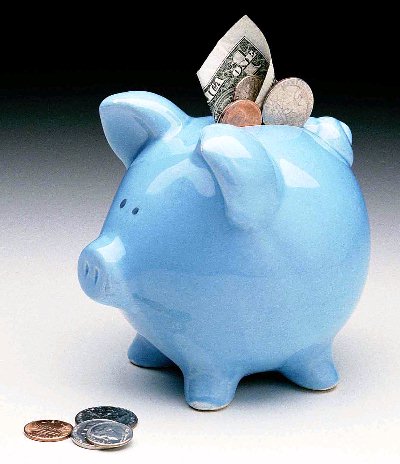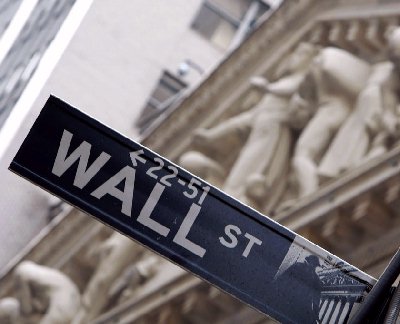|
|
|||||||||||||||||||||||||||||||
|
The American Recession of 2007, 2008 and Beyond
Economic DownturnBy Charles Moffat - January 24th 2008. Even before the world wide stock crash this week I had already concluded back in the Summer of 2007 that the subprime mortgage crisis would result in a recession. It is a shame I was correct. Yesterday the US Federal Reserve held an emergency meeting and slashed its target interest rate for interbank loans by three-quarters of a percentage point to 3.5 per cent. It is all a sign of the times and the credit crunch. Americans are buying too many things based on credit. There are simply too many mortgages, credit cards, personal loans, car loans and it was only a matter of time before the economic downtown resulted in Americans not being able to pay for everything they buy. In the case of subprime mortgages it was the result of people buying houses on credit and it created a housing bubble as people bid higher and higher prices for houses... that frankly weren't worth that much. Five years later when it came time to renew those mortgages the houses hadn't gone up in value and banks refused to renew the mortgages. People lost their homes and financial turmoil and bear markets followed as investors sell out and move their cash to gold, safe-haven bonds and stable currencies. Combined with high oil prices and two wars to pay for Americans are looking into a tough financial future and years of belt tightening. On January 21st, 22nd and 23rd stock markets around the world tumbled dramatically as investors feared an American recession would create a global recession or depression. Stocks markets crashed to post September 11th levels, some even breaking record single day falls. U.S. stock markets were closed on Monday for a holiday, but investors in Asia, Canada and Europe were carrying through from last week's concern on Wall Street that a fiscal stimulus proposed by President George W. Bush would not be enough to stop the U.S. economy from falling into recession. Bush has called for congress to pass a package worth up to $150 billion in tax cuts and other measures, but investors see this as a band-aid solution on flooding dam.
Last Friday President Bush also held a conference in which he estimates tax rebates of $800 to individuals and approximately $1600 per household (numbers based on the amount middle class families would receive) would help Americans with their pressing credit problems. Criticism surrounds President Bush as his decision will offer relief mainly to American businesses and the middle class in hopes that they will in turn create more jobs and circulate the money back into the economy. However this plan leaves the millions of low-income families out of the plan. "A mixture of weak global economic data, poor corporate data, increasing fears about the possibility of a recession ... have left investors drowning in a sea of red," said Henk Potts, equity strategist at Barclays Stockbrokers. "Risk aversion is widespread as the market thinks (the economic downturn) is not just a U.S. centric story," said Paul Robson, currency strategist at RBS Global Banking. Many indexes are now more than 20 percent below their recent cycle peaks, a traditional sign that what is going on is not just a correction but the start of a bear market. Such falls sometimes signal to large investors that it is time to buy. But leading investment bank Morgan Stanley said on Monday that that was not the case now, at least as far as Europe was concerned. "We are not compelled to buy yet despite bearish sentiment," its European equity strategy team said in a note. "We continue to prefer cash over equities." The global equity market weakness prompted currency investors to liquidate risky positions, lifting the low-yielding Japanese yen while the slightly weaker Euro and the American dollar gained on the view no country will escape the economic downturn. The Federal Reserve, the central banking system of the US, is expected to “slash benchmark lending rates to 2.5% by the third quarter” of 2008. Merrill Lynch, a wealth management company and bond trading operation, has been trying to recover from a $9.8 billion loss since last year and a recession will not help matters.
How Would Canada be Effected?Meanwhile, Prime Minister Stephen Harper believes that “Canada is in relatively good shape as it prepares to ride out a slowing economy.” Employment rates may drop as Canadian manufacturing companies could lose business from their American consumers, now wary of their spending habits. Economists expects the US unemployment rate to rise from 5% to 6.5% with a recession in the US. Poverty could increase among the current 1 in 10 Canadians already living in poverty, as the welfare system and employment insurance are expected to change drastically with a recession. On the flipside, Canadian fuel could decrease to nearly 80 or 90 cents per litre with a sustained American recession. Traditionally one would think the Harper administration would result in a steady Canadian economy in the next year, many Canadians are still worried. These days Harper has a tendency to appear to be asleep as the wheel. A survey this past week revealed that 61% of Canadians believe the economy will worsen while only 17% foresee a healthier economy in the United States for 2008.
How to Invest and Save During a RecessionRecession can have a huge ripple effect not only for current projects but also future investments. How can one have recession proof investments? Is there any sector that will not be affected, if you are unemployed and business is worse than last year? Ever since 2008 has started, the keyword ´recession´ is hitting the strongest of the companies. Everyone is on the defensive. The slump in the U.S housing sector and the stock exchange has set back the reserves. It has prompted everyone to consolidate their accounts and portfolios. Look at the positive side, the recession is bringing some challenging opportunities. This is the time one has to look at the big picture. America is facing economic challenges and it could affect other countries. The Asian markets are already witnessing a yo-yo phase where small investors fear losses. Investments in real estate and stock exchange are already plummeting. The biggest casualties during the recession are FMCG stocks, fly by night operators, small and some mid cap companies. Investments have to be made in companies that are rock steady and have lasted for more than 25 years in the market. These companies are going no where and will survive any of the bubble bursts in recessions to come. There is no point in being bullish at this stage. Diversify the portfolio; sell the old stocks that will not give any more gains. Despite the American markets having not declared the status of recession, it is still wise to be on guard. Unemployment is rising, lay-offs are no longer surprising, credit crunch, negative trends, real estate bubble bursting, budget deficits and most of all weakening of the U.S dollar are a reality that all of us are facing. Why are we being affected half way across the world? American economy is linked with many other economies in the developing countries. The American economy dented in 2007 despite Asian countries performing well in the stock market. If we have to survive the American recession we have to be make careful investments. Rather than going for any more stocks or equities it is better to stay safe on the sidelines with cash in hand and look for cheaper investments. Invest in stocks of other countries where the economies are still strong. The Euro and pound is on the top of the heap. For a long time the blue chips will be in European stock exchanges. These are the economies that will be rock steady in the wake of the American collapse. The year 2008 is critical, which will challenge even intelligent investments. Not all investment is recession proof. Have liquidity around the house. Settle for less and keep calm. Review the portfolio before attempting to diversify. Invest in long term stocks. Go for some traditional fixed deposits to the bank. They are a safer bet.
So how does one save money during a recession?Have you been saving hard for the world trip for the last two years? Looks like the wait will be longer yet. Whether you are a professional, businessman, employee or employer, saving is your profit. Investments are likely to freeze and this is the time to make cuts in every way to save resources. Just because there is a recession, chances are, there will be less buying and selling. But business will not come to a grinding halt. The real estate sector has seen the biggest upsets of the early recession. It is hard to tell where you can save. Pull and push will be inevitable in most markets. But it could be that the market you are investing in is not really doing so badly. You may stand to make a gain. Most people tend to make the mistake of withdrawing from the fray rather than taking the risk. Go ahead and make the investment. It could be the biggest saver for your financial condition. If your research is right, you may be able to save despite spending during the recession. In economic slowdown only the stronger companies will have the ability to survive. And those who can innovate during this time are the ones who will drive the market forces. You can save not only cash by also resourceful talent during the slump period. Here is what that can be useful: Don´t just fire anyone, loyalty pays. Don´t stop the networking with the clients even if you are not doing business with them. When the time is ripe you don´t want them to ignore you. Take some risk. Being afraid of failure will not be helpful. Avoiding it maybe harmful. Go on launch the new product. The response will be slow. But when the markets are buoyant, they will pick up. Don´t get too defensive. Don´t stop the outsourcing of talent or consultancy. They will help to tide the difficult times. Saving is not only in terms of liquid cash. Every member in the organisation is a family member. As the family stays through thick and thin, these are the times when it is safe to be together. Give the employees the incentives to save money even during this period. This saving will help them and you as well during the recession. Spend money during this period on garnering goodwill. Have an emergency fund scheme which will take care of at least six months during the period when the recession hits the hardest. This gives time to cope up with the bad times and prepare for the next quarter.
Definition of a RecessionRecession is not to be confused with depression. Recession means a slow down or slump or temporary collapse of a business activity. In its early stage it can be controlled in a methodical manner. Experience helps to avert total collapse. Unchecked, it leads to severe depression. Depression is a dead end. It is time to close shop completely. It is a total state of irrevocable economic failure. When a country is doing well all round its Gross Domestic Product (GDP) is on the rise. Overall economy is bullish; it is not only the stock exchanges that tell riches to rags stories but even small businesses. It all adds to the national exchequer. An economist is likely to give a detailed, comprehensive definition of recession. But for the layman who has been affected knows it only one way-when he loses his job and has no money to pay his credit and loans. Recession is when the consumer faces foreclosure and the banker comes knocking for his pound (or dollar) of flesh. Many companies and whole countries go bankrupt for want of liquid funds and cash flow for even daily requirements. If you look at it from the point of view of a businessman, recession is a transitory phase. The Business Cycle Dating Committee of the National Bureau of Economic Research has another definition. It profiles the businesses that have peaked with their activity in one season and it falls naturally in the next season. It regains its original position with new products or sales and continues to expand. This revival makes the recession a mild phase that large companies tolerate. As the fiscal position rises, there is no reason to worry. Recession can last up to a year. When it happens year after year then it is serious. Are we facing a recession or not? Yes, for the simple reason that not only our neighbors but our friends are unemployed. There is less of business talk and more billing worries. Transitory recessions are good for the economy, as it tends to stabilize the prices. It allows run away bullish companies to slow down and take stock. There is a saying, ‘when it’s tough the tough get going’. The weaker companies will not survive the brief recession also. Stronger companies will pull through its resources. So when is it time to worry? When you are facing a foreclosure, when the chips are down and out and creditors file cases for recovery. Firms face closures when they go through recession and are not able to recover from losses. If, at this time, they are not able to sustain their prices and stocks then there is more trouble. Even when the recession period gets over, they will not be able to do well. If a business survives a recession period they should be able to survive a depression. But how many recession proof businesses are there? Who will eventually survive the recession?
1. Those that have been able to save their funds.
|
|
||||||||||||||||||||||||||||||
|
Website Design + SEO by designSEO.ca ~ Owned + Edited by Suzanne MacNevin | |||||||||||||||||||||||||||||||
